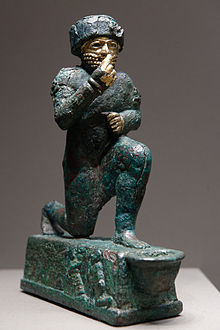
Back أمورو Arabic Марту Byelorussian Martu (Gott) German Amurru (dios) Spanish مارتو Persian Amurru (dieu) French Amurrú (isten) Hungarian Martu (divinità) Italian Martu Lithuanian Amurru Romanian
| Amurru | |
|---|---|
Divine representation of Amorites in the Mesopotamian pantheon | |
 The "Worshipper of Larsa", a votive statuette dedicated to Amurru for Hammurabi's life, early 2nd millennium BCE, Louvre | |
| Other names | Martu |
| Major cult center | Babylon and an unknown city in the Sealand |
| Symbol | gamlu (a type of staff), gazelle |
| Parents | Anu and Urash |
| Consort |
|
Amurru, also known under the Sumerian name Martu (in Sumerian and Sumerograms: 𒀭𒈥𒌅[1]), was a Mesopotamian god who served as the divine personification of the Amorites. In past scholarship it was often assumed that he originated as an Amorite deity, but today it is generally accepted that he developed as a divine stereotype of them in Mesopotamian religion. As such, he was associated with steppes and pastoralism, as evidenced by his epithets and iconography. While this was initially his only role, he gradually developed other functions, becoming known as a god of the mountains, a warlike weather deity and a divine exorcist.
He is first attested in documents from the Ur III period, chiefly in Sumerian and Akkadian theophoric names. Later he also came to be worshiped in Babylon, Assur and other locations in Assyria and Babylonia. He had his own cult center somewhere in the area known as the Sealand in Mesopotamian texts.
Only a single myth about Amurru is known. It describes the circumstances of his marriage to Adgarkidu, the daughter of Numushda, the city god of Kazallu. Other sources attest different traditions about the identity of his wife. The goddess Ashratum is particularly well attested in this role. His father was the sky god Anu and it is presumed that his mother was usually Urash.
- ^ Frankfort, H. (1939). Cylinder seals: a Documentary Essay on the Art and Religion of the Ancient Near East. MacMillan and Co., Pl. XXVIII e+i